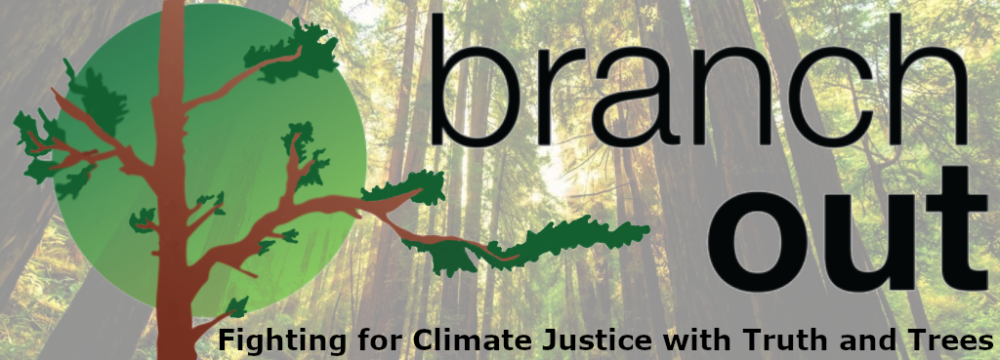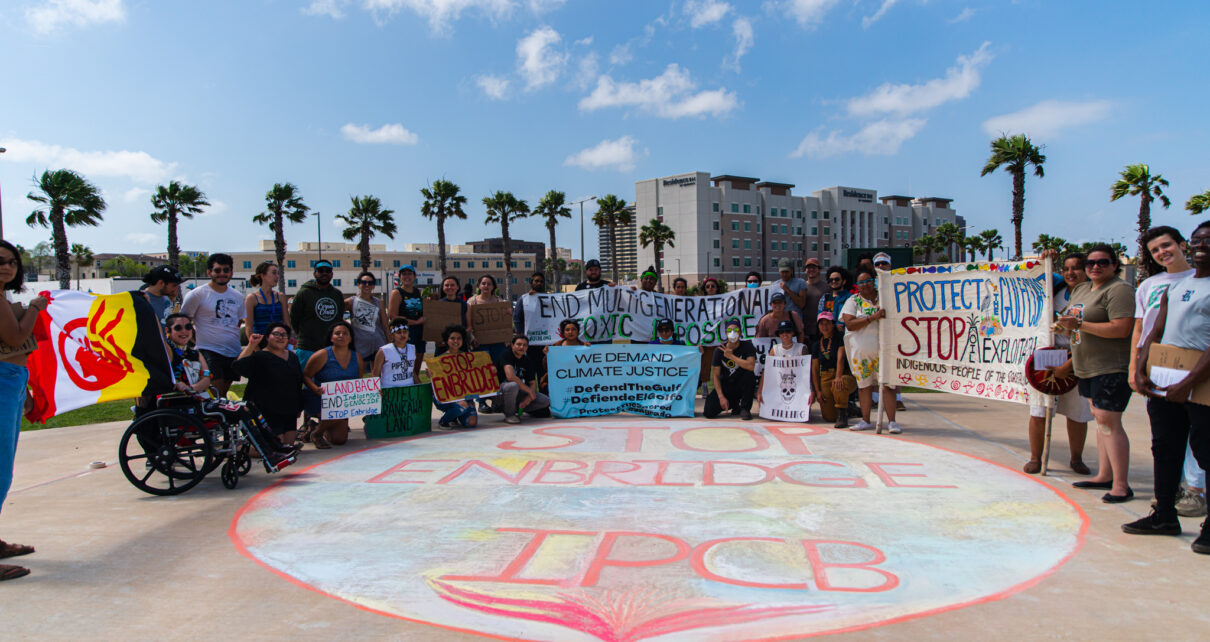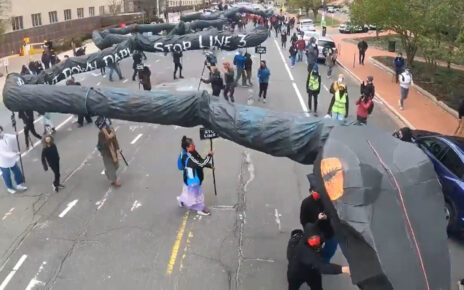A group of close to 100 concerned community members and Karankawa Kadla Indigenous people gathered in Corpus Christi, Texas, on Saturday, April 23, under the banner “Stop Enbridge.” The group came together to act against Enbridge’s plan to expand a crude oil and liquid natural gas (LNG) export terminal off Corpus Christi Bay near Ingleside, Texas. Expanding the terminal would require dredging near the ecologically sensitive Redfish Bay and disturbing the culturally significant Karankawa archaeological site known today as McGloin’s Bluff.
The action was led by the Indigenous Peoples of the Coastal Bend (IPCB), with a coalition of organizations coming to show support, including For the Greater Good, Fenceline Watch, Texas Campaign for the Environment and The Sunrise Movement. Many Karankawa people testified, sang, played drums and prayed as part of the action. The group chanted “Protect Karankawa Land! Protest Enbridge, take a stand!” “From North to South and East to West, the people united will never rest,” and other slogans, before a series of speeches were given.
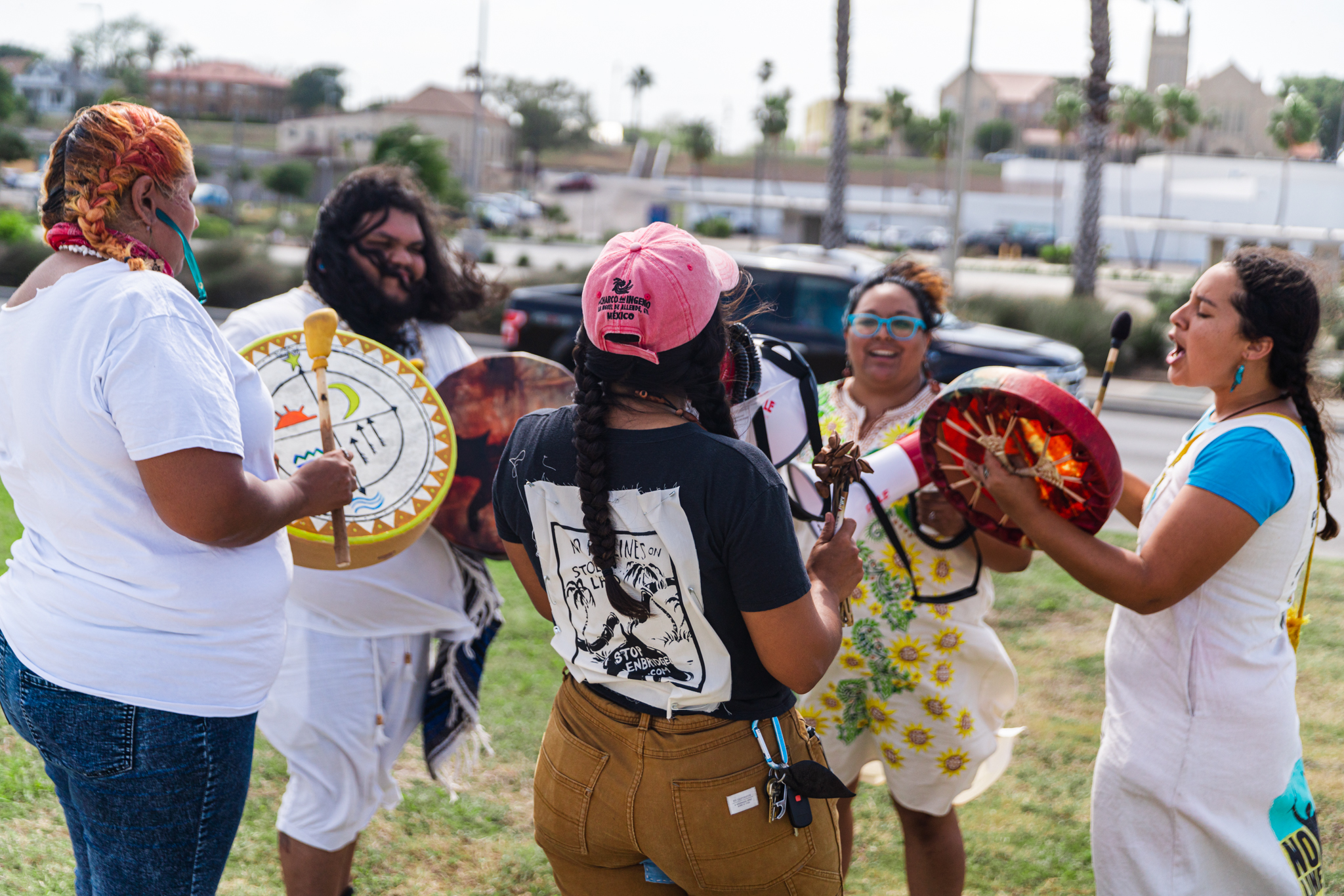
Chiara Sunshine, a proud Karankawa Kadla from the Hawk Clan, led many of the chants and songs before giving a powerful testimony to the crowd:
“They [Enbridge] want to profit off of the undeniable devastation that this would cause to the land, the ecosystem, our swimming and crawling relatives, and to us, the Karankawa Kadla. The land they want to build on is sacred to us. It is where my relatives from the coyote clan journey to pray and gather in thanks and it is where our ancestors left their tools, pottery [and] artifacts for us. It is a tangible piece of our lineage that connects us to that land, and we have been connected to this land living on it, protecting it for at least the last 2000 years. Enbridge, you have no right to take this from us. You have no right to continue to push Indigenous peoples off of their homes. Enbridge, you are a settler on Karankawa land and we do not want you here where you will only exploit the land and their people of their so-called resources until she is husk dry. And then what will you do? When you have sucked the land dry when you’ve grown your business at the cost of your own peoples’ futures?”
Karankawa Kadla
Karankawa Kadla is the name mixed descendants of Texas’ Indigenous Karankawa people have taken for the Tribe. The Karankawa Kadla are not a federally recognized Tribe, which excludes them from certain legal rights and protections granted to other Indigenous groups. The Karankawas lived around the Texas coastal bend before Spanish settlers invaded the land. The Karankawas were able to survive for a long time despite colonizers attempting to take their territory.
By the mid-19th century, however, most Karankawas had been forcibly displaced, attempted to integrate within the larger population, or been killed by white settlers. Stephen F. Austin, who Texas’ capital city is named after, once called the Karankawa “universal enemies of man” and said “there will be no way of subduing them but extermination.” The Dallas Holocaust and Human Rights Museum has recognized that the Karankawas were targeted in a deliberate genocide by white settlers. Even today, many Texans do not know that Karankawa people still exist.
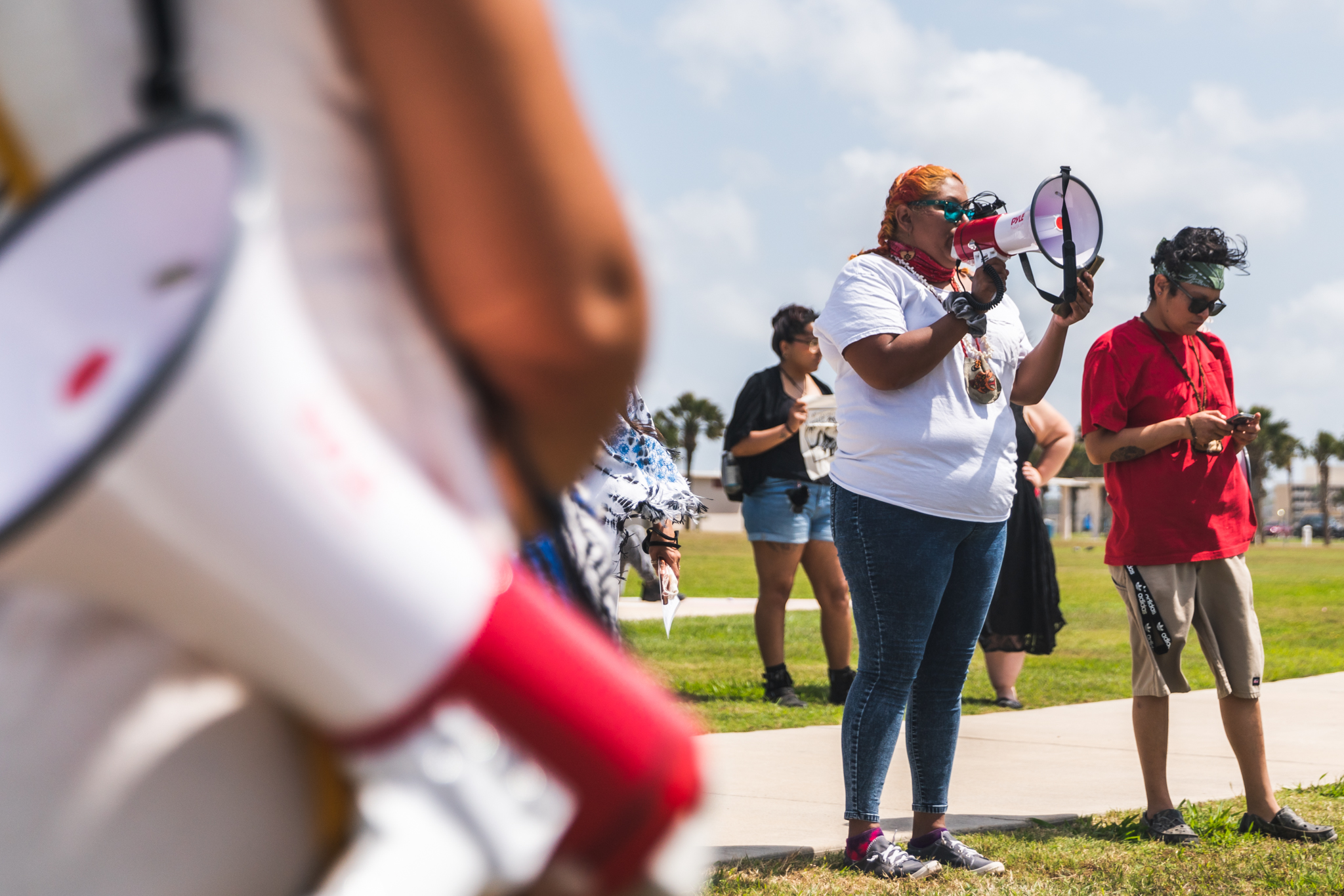
The Karankawa Kadla, however, have persisted, continuing to bring scattered relatives from across Texas and other parts of the United States into their efforts to stop Enbridge. Love Sanchez is a cofounder of Indigenous Peoples of the Coastal Bend and has become a leader of the resistance to Enbridge and other destructive corporate pollution of land and water. In an interview with Branch Out, Sanchez spoke about the need for everyone to be conscious of the land they occupy and to support Indigenous People fighting to protect it: “Learn whose land you’re on and see if they’re going through anything. Help them. See if they’re struggling with something there.”
Enbridge
Enbridge is a Canadian-based fossil fuel pipeline operating company that has become infamous for its Line 3 Pipeline project through Anishinaabe land and Mississippi river headwaters in Northern Minnesota and Manitoba, Canada. In September 2021, Enbridge purchased the Ingleside Energy Center Terminal from a much smaller company Moda, just weeks after the IPCB, Karankawa Kadla and a local environmental group filed a legal action to stop the terminal expansion.
Enbridge’s track record includes multiple instances of misleading the public and mistreating Indigenous water protectors. The company has run deceptive ads in Michigan where it used the image of a NOAA scientist to claim Enbridge closely monitors water quality impacts. In Minnesota, Enbridge did not deliver on the number of local jobs it had promised the community to create. Moreover, the company has a history of lying about safety precautions that can directly impact water quality.
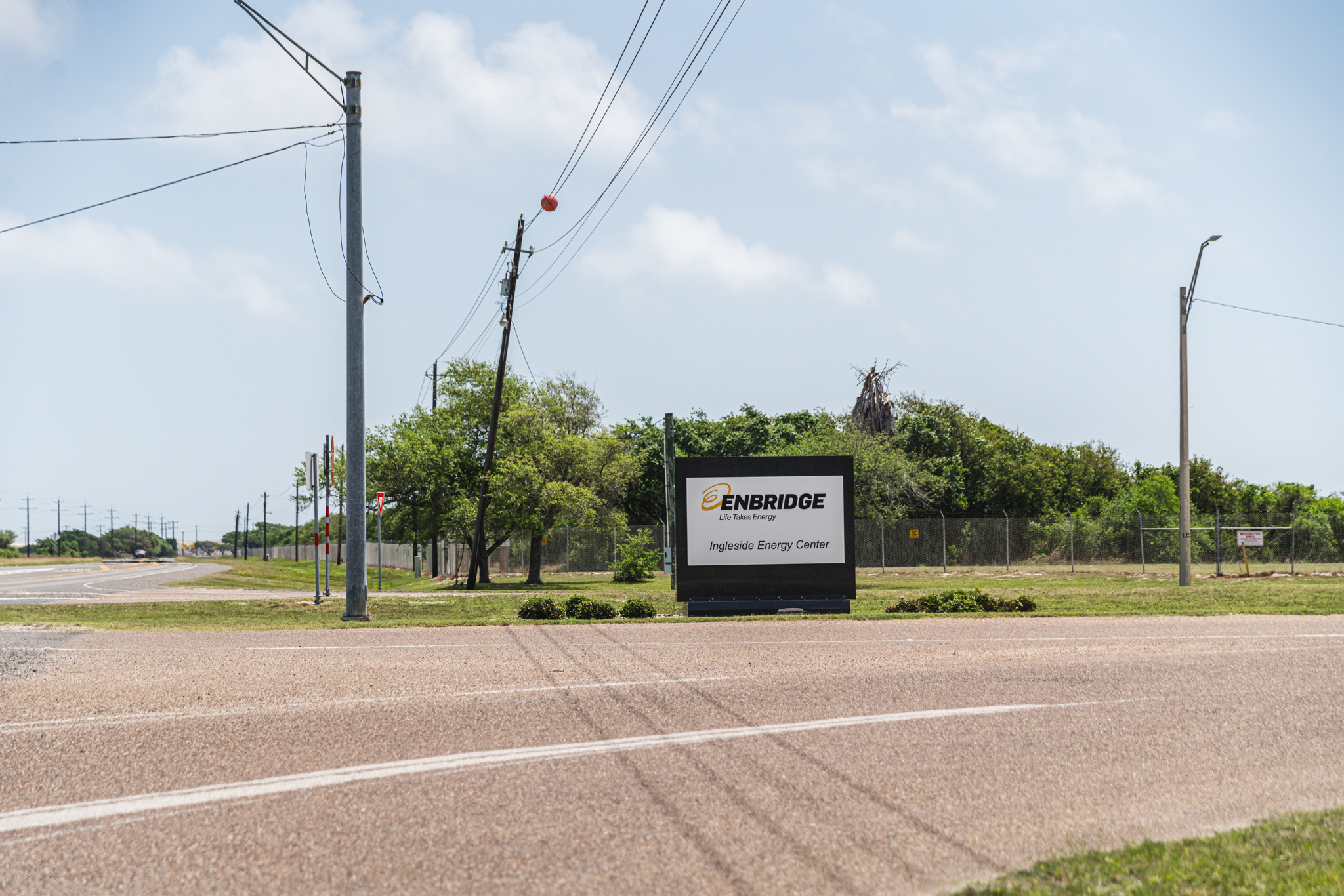
The Ingleside Energy Center sees some of the highest volumes of fracked LNG and crude oil exported through its terminal in the entire United States. It can store 16 million barrels at once and its export facility is capable of loading 1.5 million barrels each day into massive ships docked in the Gulf of Mexico, according to Tank Storage News. Moda announced plans to expand the terminal by constructing a new pier on McGloin’s bluff.
The Army Corps of Engineers approved the permit under Section 404 of the Clean Water Act to allow Enbridge to dredge 43 acres of seabed near Redfish Bay, which would disturb roughly 3.9 million cubic yards of sediment. Dredging is when large amounts of sediment are moved from the seafloor to make a certain section deeper. It is necessary for the expansion of the terminal because the ships that come to carry crude oil and LNG are extremely large.
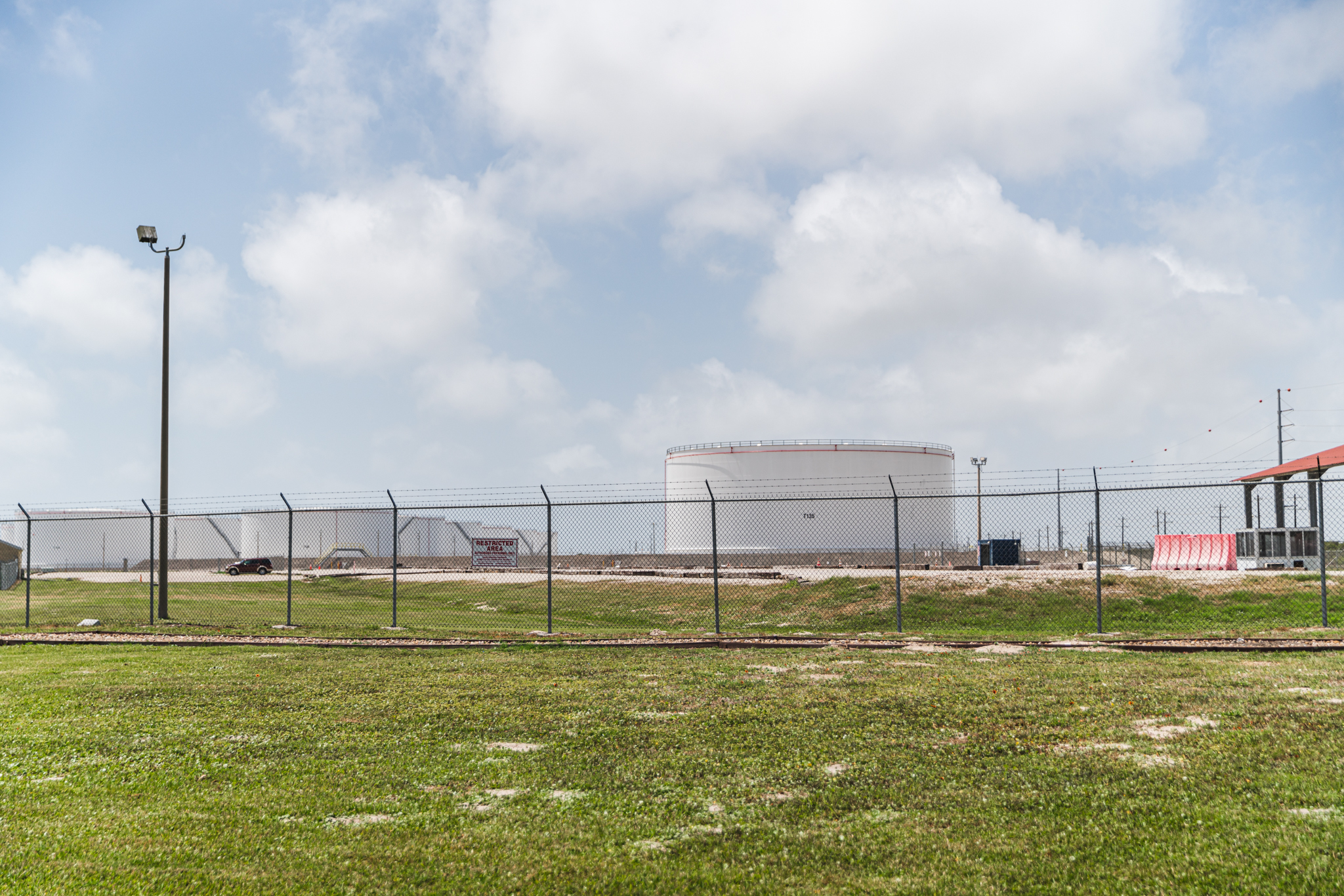
Lawsuit
Love Sanchez told Branch Out that the Karankawa Kadla had testified to the Texas Commission on Environmental Quality (TCEQ), Texas’ State environmental agency, asking them not to approve dredging permits for the Ingleside Energy Center. TCEQ did not listen, and after it approved the permit, it went to the federal level for final approval.
Sanchez spoke about how the enormous ships that come to the terminal, known as Very Large Crude Carriers (VLCCs), kick up silt that covers the seagrass. “The seagrass is really important to our marine life here and our marine life is sacred. They survived just like we did! You got the Redfish, Trout, tiny organisms and basically, the entire ecosystem depends on each other, so as the sea beds are getting destroyed by the ships, it’s also gonna be destroyed by the dredging.”
After the Army Corps of Engineers approved a permit for Moda to dredge near Redfish Bay, three groups, the Indigenous Peoples of the Coastal Bend, the Karankawa Kadla and Ingleside on the Bay Coastal Watch Association, brought a lawsuit against the Army Corps to try and stop the permit. Only a few weeks later, Enbridge, a company with years of experience fighting lawsuits from Indigenous Rights and Environmental groups, bought the Ingleside Energy Center from Moda for $3 billion and began fighting the suit.
The lawsuit alleges that “expansion will have significant impacts on the environment, the surrounding community, and the public interest” and points to the impact of dredging on “diverse seagrasses and estuarine wetlands.” While the litigation is ongoing, the lawsuit has been successful in delaying the project. But in August 2022, construction can begin again unless the permit is legally struck down.
McGloin’s Bluff
McGloin’s Bluff is the historic site of a Karankawa Settlement, and there are numerous culturally significant archaeological items that remain to this day. The Texas Archaeological Society knew about the artifacts at McGloin’s bluff dating all the way back to 1963 when it published the findings of archaeologist James Corbin.
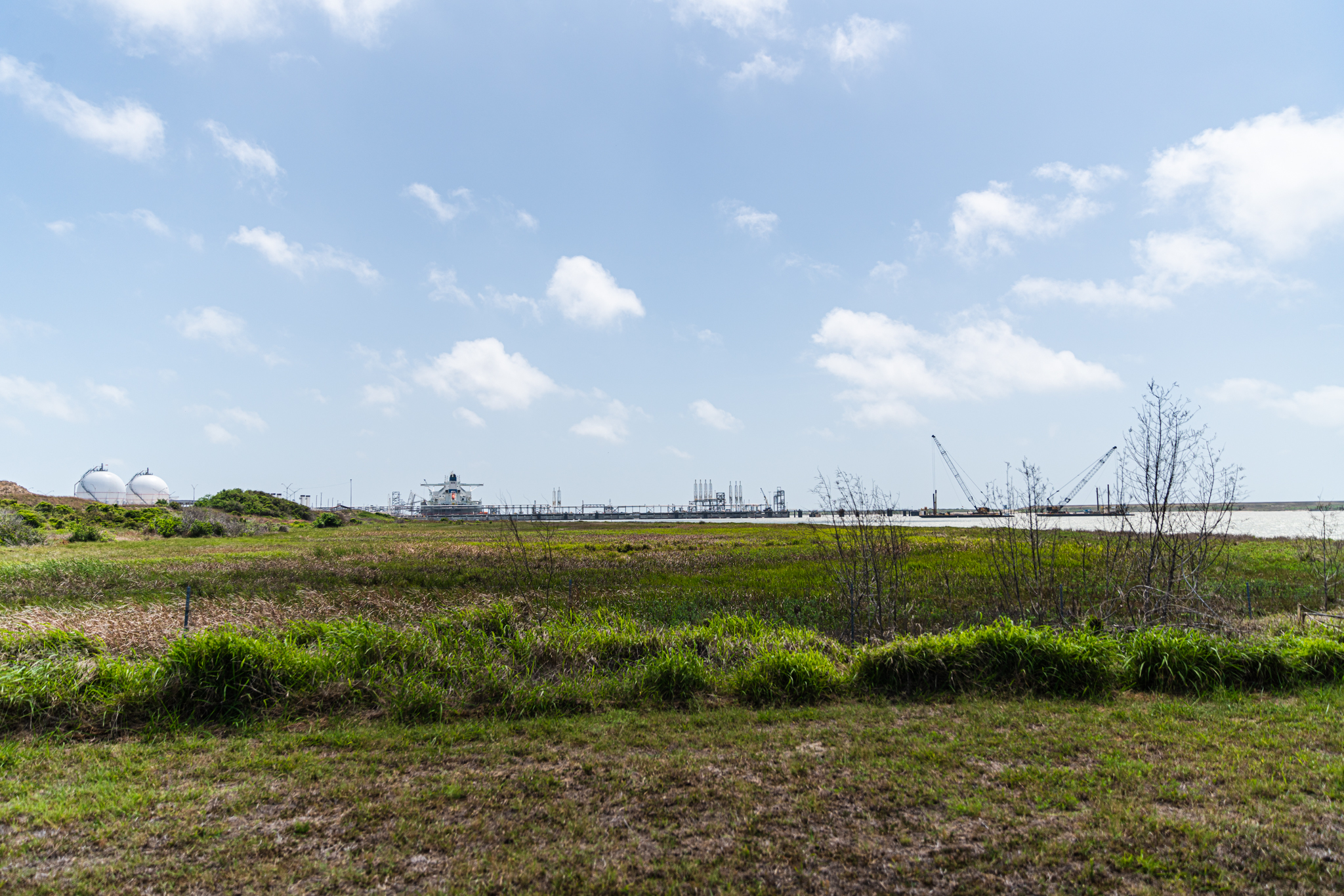
According to a report in the Texas Tribune, in 2006, the Texas Historical Commission sent a letter to the Port of Corpus Christi Authority stating that the site is eligible for inclusion in the National Register of Historic Places and urging the port authority not to allow any development of the site. In 2008 – ‘09, about 40,000 artifacts from the Karankawa village were recovered and sent to a lab at the University of Texas at San Antonio, but countless thousands of pieces of Karankawa history may remain at the site.
When talking to Branch Out, Love Sanchez said it is devastating to think about the loss of historical cultural artifacts important to the Karankawa Kadla. Although Enbridge has told the community that they will not disturb the land on McGloin’s bluff, Sanchez does not take Enbridge at its word, and she is convinced that it will disturb the archaeological site to construct a new pier:
“They [Enbridge] tell us they’re not going to be dredging on the land, they are there’s no way. They’re going to have to construct a new pier. They’re going to do construction on the land. That’s a lie when they say ‘we’re not going to do anything.’ You’re going to have to dredge in new piers into the land to be able to come out to the water. So we really hope those acres are protected.”
‘Stop Fossil Fuels’
Chiara Sunshine also spoke about the important connection the Karankawa Kadla feel with their ancestral land and the history inherent in the artifacts on McGloin’s bluff. “My people who have lost nearly everything to colonization and corporate greed have one tangible piece left and it’s this. This land is our spirit, our past, present and future, and I refuse to sit idly by while you snatch the opportunity to even see this land out of the hands of our future generations,” she told the crowd gathered in Corpus Christi on Saturday.
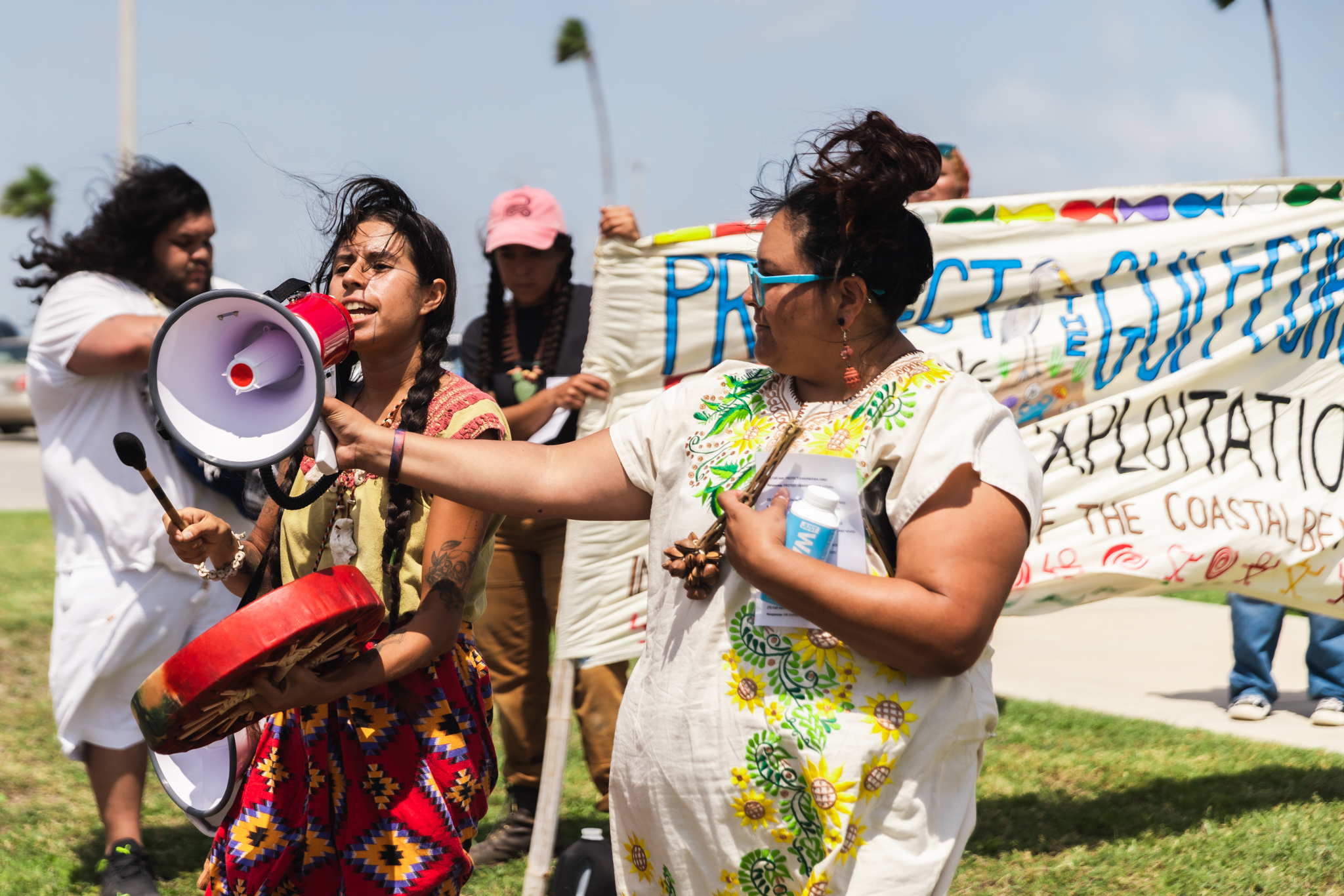
In addition to threatening the local ecosystem and the Karankawa Kadla, Enbridge’s expansion of the Ingleside Energy Center will accelerate the climate crisis. By doubling the export capacity of fossil fuels at the largest U.S. export terminal, Enbrige’s plan encourages more fracking and drilling by the fossil fuel industry. This could not come at a worse time for the Earth’s climate, as the Intergovernmental Panel on Climate Change (IPCC) report just last month warned that every tenth a degree of global warming matters, and continuing to burn fossil fuels at the current level will make achieving the goals of the Paris Climate Accords impossible.
Chiara Sunshine also evoked how the Karankawa Kadla struggle fits within the context of climate change and the need to stop fossil fuel projects, especially those threatening Indigenous land and water. “Stop fossil fuels. Stop the continued erasure of my people and all other Indigenous peoples. We have been here and we are still here, and we, as our ancestors did, will continue. We will not give up without a fight,” Chiara said on Saturday.
By resisting Enbridge’s expansion of the Ingleside Energy Terminal, the Karankawa Kadla are playing a crucial role in preventing more fossil fuel expansion, in addition to protecting their land and history. They remain defiant against the corporate-led destruction of their land, as Love Sanchez told the crowd, “Enbridge, this is your eviction notice from the Karankawa Kadla.”
